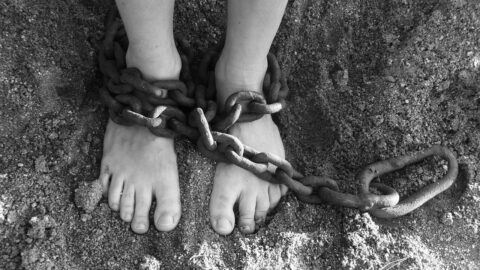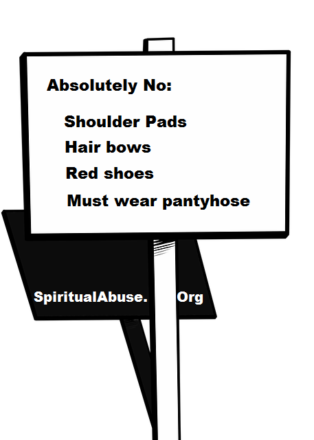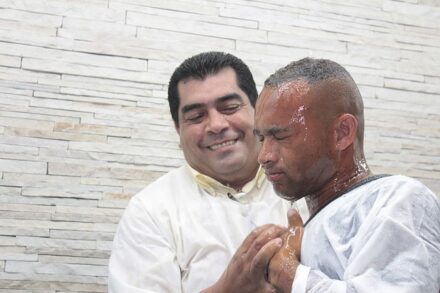This is probably going to end up being an ongoing debate between me, myself and I.
For a long time after I left my former church, I believed that baptism in Jesus’ name was right. Then I thought it was better. Then a Oneness Pentecostal argued with me about baptism in Jesus’ name, thinking I was Trinity. And I realized how wrong some of their arguments were. Reading back through some of my blogs tonight, I realized just how much my thinking had shifted even since then- in a good way.
Now, I’m considering getting re-baptized, and think I may keep notes of some of what I’m studying and some of what I’ve learned here.
OK, for starters, I’ve considered re-baptism for a number of reasons since leaving, some good and some not so good. One of the first reasons I considered was making a clean break from the Oneness movement. That was not a very good reason for me. For starters, baptism isn’t meant to be used as a way to take a stand against a group of believers. Also, a “clean break” is really not possible when you still live among the group you’re breaking from. They wouldn’t even know I’d gotten re-baptized–any “break” would only be in my own mind.
Separating myself from them eventually came in the form of wearing pants and short sleeves even when they might see me. Curiously, most of them have been more accepting of me since I changed the way I dressed. Even just tonight, riding my bike, one drove by, smiled, waved and called my name. No disgust–he actually looked happy for me! (Which makes me wonder how many of them truly believe what they’re living… but that’s another blog for another time.)
*****
Again, I considered it simply because there’s so much division caused as a result of the debate (of baptism in the name of Jesus). Yet getting re-baptized won’t stop the debate, and I’ve already shown whose side I’m on by where I attend church, how I live my life, and so forth. Yet it might be done for unity’s sake. That one I need to think about more.
****
Re-baptism can definitely be a public testimony and witness. But of what? If my testimony is “I’m not one of THEM,” indicating another group of believers, that’s not a good enough reason for me, personally. However, if my testimony is an answer of a good conscience toward God, a way to say, “yes, I truly believe,” then it might be right. Motive is the key in that case.
****
I also have to consider historically and Biblically if re-baptism is acceptable or right. I don’t find anything in the Bible that says people were re-baptized, except in the case of the disciples of John in Acts 19. My personal feeling is that these disciples, not “having heard whether there be any Holy Ghost” probably were not familiar with Jesus’ death, burial and resurrection. They had been baptized to repentance but not baptized into the body of Christ, or as believers in Jesus. When they were re-baptized, it was to signify their belief in Jesus, whereas before it had not.
Historically, from what I can tell, believers were baptized once, except in the case of those who, like Anabaptists, were christened as children and re-baptized as adults due to a change in beliefs.
I find nothing for or against re-baptism either historically or Biblically. Research in these areas leaves me with no answers, and if anything possibly a few more questions. How do I fit into either of the groups in the paragraphs above, if I do? My beliefs have changed drastically even over the last few months. My understanding of Jesus and His sacrifice has expanded. But is that, in my case- since I believed in Jesus when I was first baptized- something I should be re-baptized to signify? I don’t think so, at least for me. Each person is different, though. If I’d ONLY been baptized once, in Jesus name, I think I’d feel much differently about my answer.
*****
By the same reasoning, I can conclude that it doesn’t matter if we believe baptism is salvational or not–the main thing is that we are believe and are baptized, not exactly what we believe about baptism.
These being the case, my baptism is as acceptable as anyone else’s. Also, to be re-baptized to join A church rather than THE body of Christ is a little beyond my means right now. That concept seems more than a little small-minded or limited in concept to me. And maybe even a bit divisive. It’s also slightly stuck-up, for lack of a better description. How could a church say, “Yes, you are a Christian, a Heaven-bound member of the body of Christ, but you would have to be re-baptized to be part of this local church?” (This church hasn’t said I’d HAVE to, but still…)
****
Regarding baptism as a means of becoming part of the body of Christ rather than a local church, though I didn’t understand it at the time, when I was baptized in Jesus’ name I was also (unwittingly) baptized into a set group of believers. And THAT group later said I wasn’t even a Christian until I’d been baptized their way. So the above is an almost laughable concern in some ways.
****
Apparently, no one is asking me this time to deny my first baptism. No one is driving me to join their church or telling me that there’s only one right way to be baptized. It would bother me if I were told that I had to deny my whole Christian walk up til this point, which is what happened after I was baptized in Jesus’ name. No, no one said that verbally, but it was indicated in many smaller ways. As far as the United Pentecostal Church was concerned, I started living for God after I got re-baptized in Jesus’ name and spoke in tongues. And that was NOT the case. I had to deny or ignore some wonderful things God had done earlier in my life to accept that. It wasn’t until I left the UPC that I finally understood how conflicted that had made me.
*****
I also consider what I’ve been taught through the years: that baptism was necessary for salvation, that getting re-baptized was completely wrong for any reason (due to a severe twisting of Heb 6:4-6), and, finally, that if I’d been baptized in Jesus name and then was re-baptized using the traditional Trinitarian formula I’d be hell-bound. I’ve wondered if I’d make myself sick or face residuals either before or after getting re-baptized because of these harsh teachings, and I’ve wondered if there were any truth in them. (I don’t think there is, but…) Would I make a public commitment and then not be able to follow through, end up explaining that I’d been taught these things and that they were giving me nightmares? Or are those things far enough behind me that getting re-baptized could be the joyous commitment that it’s supposed to be?
In other words, I think I believe a certain way, I say I believe a certain thing, but if faced with acting on the beliefs I claim, would I?
****
I’m also more than a little nervous about making a public commitment of any sort to church again. Even a good church that I really enjoy. Will I stick with it? Will I want to be there in a year? In three? Will they change after I join and become like others I’ve experienced?
To be continued….














